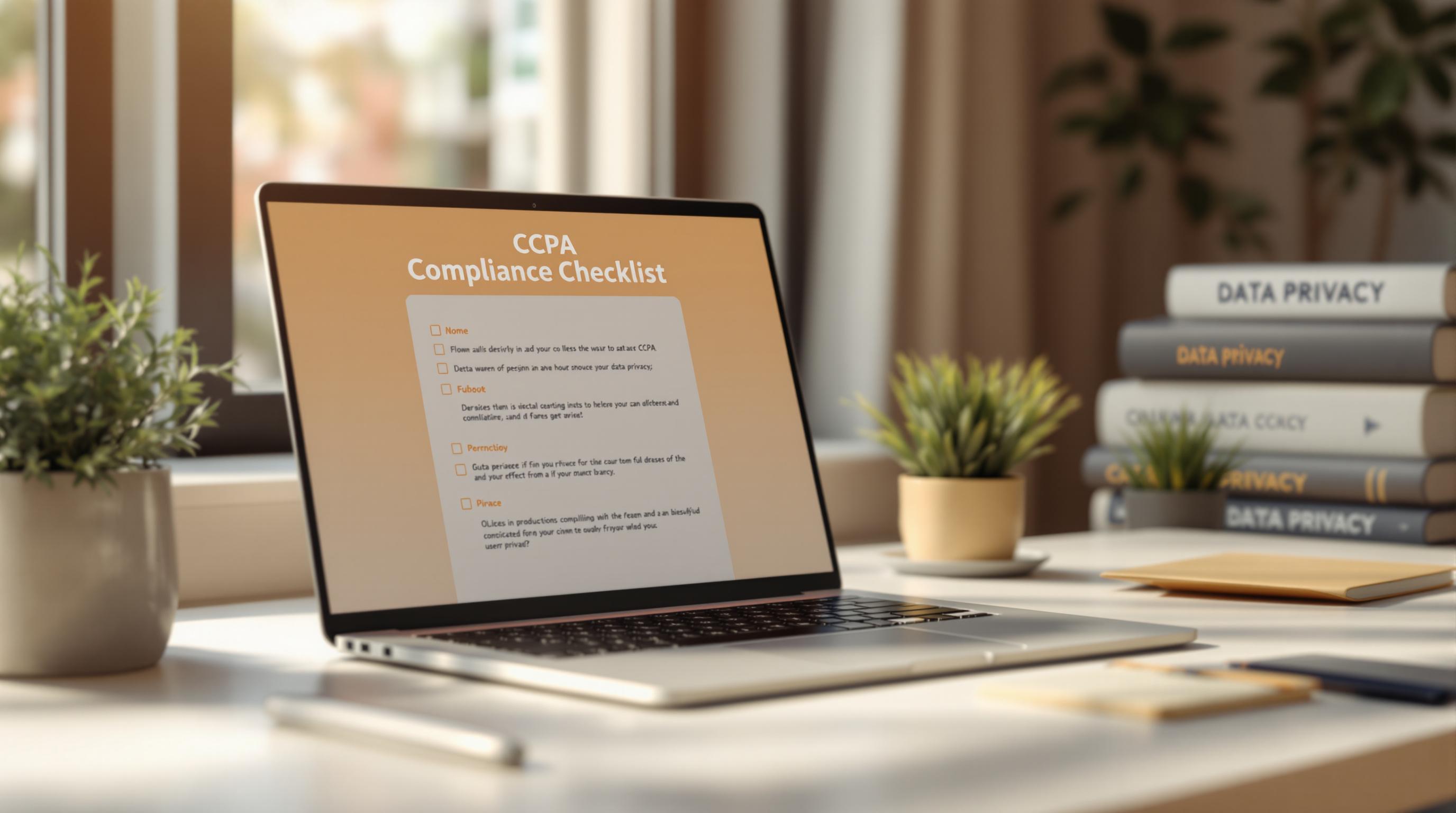- Why it matters: A privacy policy ensures compliance with laws like GDPR and CCPA, avoiding fines and building trust with your subscribers.
- What it covers: Data collection, usage, storage, user rights, and security measures.
- Top options:
Quick Comparison:
| Provider | Free Option | Compliance (GDPR/CCPA) | Customization | Ease of Use | Best For |
|---|---|---|---|---|---|
| Termly | Yes | Yes | Moderate | Easy | Small businesses, quick setup |
| TermsFeed | Yes (Basic) | Yes | High | Moderate | Advanced compliance needs |
| HubSpot | Yes | Yes | High | Easy | HubSpot users, marketing focus |
Tip: Choose a template that fits your business size, data practices, and budget. Always ensure your policy is clear, updated, and legally compliant.
1. Termly

Termly provides a free privacy policy generator designed to meet legal standards while catering to various business requirements. It allows users to tweak pre-filled clauses, making it easier to address key aspects of managing email lists:
| Feature | Description |
|---|---|
| Compliance Coverage | Includes GDPR and CCPA requirements |
| Customization Options | Editable fields for adding business details |
| Format Flexibility | Export options: Word, PDF, Google Doc |
| Section Management | Option to remove irrelevant sections |
The platform focuses on clarity, using straightforward language to explain:
- How email addresses are collected
- Where user data is stored
- Users' rights regarding their information
- How users can unsubscribe from communications
Termly streamlines the process of creating a privacy policy while ensuring it adheres to key regulations. Its flexible structure allows businesses to tailor policies by removing unneeded sections, keeping them concise and relevant. With compliance for major privacy laws built in, Termly is a handy tool for businesses managing email lists [2].
While Termly offers a strong mix of customization and compliance, let’s take a closer look at how other platforms, like TermsFeed, stack up.
2. TermsFeed

TermsFeed provides a privacy policy generator designed specifically for email list management. It combines an easy-to-use interface with tools to help meet legal requirements.
| Feature | Details |
|---|---|
| Compliance Framework | Includes GDPR and CCPA requirements |
| Generator Type | Free basic version with premium upgrades |
| Language Style | Clear, easy-to-understand language |
| Update Management | Regular updates to stay aligned with laws |
| Integration Options | Compatible with websites and email newsletters |
The platform works for both B2B and B2C needs, allowing businesses to adjust templates to match their specific data practices [1]. The templates are written in plain language, focusing on clarity about data collection, storage, and user rights.
What makes TermsFeed stand out is how simple it is to implement. Policies can be added to websites and newsletters quickly, ensuring consistent communication about privacy across all channels [1]. By keeping policies updated to reflect new privacy laws, TermsFeed helps businesses maintain compliance while building trust with subscribers [1].
Next, let’s explore how HubSpot approaches privacy policy generation with its marketing-focused tools.
3. HubSpot

HubSpot provides a free privacy policy template designed to simplify compliance and streamline use, making it especially useful for businesses involved in email marketing.
| Feature | Description |
|---|---|
| Customization Level | Tailored to meet specific business requirements |
| Security Framework | Strong data protection measures included |
| Integration | Works smoothly with existing marketing tools |
| Update Management | Regularly updated to align with new regulations |
This template stands out for its clear structure and ease of use, offering detailed explanations about data collection, usage, and user rights. It also includes practical guidance to help businesses incorporate the policy into their marketing workflows.
One of its key strengths is its strong focus on security. The template covers critical areas such as:
- Data protection practices
- Encryption measures
- Access controls
- Data retention policies
For companies already using HubSpot's marketing tools, the template integrates effortlessly, ensuring consistent privacy standards across all channels [1]. Regular updates keep it aligned with the latest privacy laws [1].
To get the most out of the template, businesses should customize it to match their specific data practices. This ensures transparency and builds trust with users [1].
Although HubSpot offers many useful features, it's worth comparing its template with other options to determine the best fit for your business.
sbb-itb-8abf799
Advantages and Disadvantages
When selecting a privacy policy template provider for email lists, it's important to weigh their strengths and limitations. Here's a comparison of three major providers:
| Provider | Advantages | Disadvantages |
|---|---|---|
| Termly | • Free generator with quick setup • Pre-filled common clauses • Customizable to business needs • Saves time |
• May need additional legal review • Generic template structure • Limited industry-specific options • Basic features in free version |
| TermsFeed | • Easy-to-use interface • Covers legal requirements thoroughly • Advanced policy options • Strong GDPR compliance |
• Premium features can be costly • May require legal expertise for full compliance • Customization can be complex • Price may deter small businesses |
| HubSpot | • Free customizable template • Strong security measures • Regular updates for regulations • Integrates well with marketing tools |
• Limited template variety • Requires significant customization and legal review • Generalized framework |
The best choice depends on your business's specific needs and resources. For smaller businesses managing basic email lists, Termly's free generator offers a simple, time-saving solution. Larger organizations with more complex data operations may find TermsFeed's advanced features worth the investment.
Free options like Termly and HubSpot work well for businesses with limited budgets, but TermsFeed's premium features are better suited for those dealing with intricate data practices. Beyond compliance, these templates help build trust by showing a commitment to protecting subscriber data. However, the level of customization required varies, even though all three providers offer GDPR-compliant frameworks [1].
In short, the right privacy policy template will fit your compliance needs, budget, and long-term goals while ensuring your policies meet current legal standards.
Conclusion
Picking the right privacy policy template is crucial for staying compliant and earning your subscribers' trust. For small businesses, Termly's free generator is a quick option with pre-filled clauses and an easy setup for basic compliance. If your business requires more advanced features, TermsFeed offers strong GDPR tools, though its premium options can be pricey. For those already using HubSpot, their templates integrate seamlessly with their marketing tools and are updated regularly to meet legal standards.
Email marketing thrives on trust, and a well-written privacy policy isn't just about meeting legal requirements - it can also give you an edge over competitors. When implementing your chosen template, keep these points in mind:
- Opt for a provider that regularly updates templates to align with changing regulations.
- Make sure the template allows for enough customization to match your specific data practices.
- Use clear, simple language to ensure your policy is easy for users to understand.
For businesses with growing email lists or more complex data needs, choosing a flexible and regularly updated solution is key. A clear and tailored privacy policy helps ensure compliance while building trust with your audience.
FAQs
How do I create a GDPR compliant privacy policy?
To craft a privacy policy that aligns with GDPR requirements, focus on these four key areas:
-
Use Simple Language
Avoid complicated legal terms. Write your policy in plain, easy-to-understand language so subscribers know exactly what they’re agreeing to. -
State Your Legal Basis for Data Collection
Be transparent about why you’re collecting personal data. Common reasons include:- Getting explicit consent from users
- Meeting legitimate business needs
- Fulfilling contractual obligations
-
Outline User Rights Under GDPR
Make it clear what rights users have, such as:- Accessing their personal data
- Correcting inaccurate information
- Requesting data deletion (the "right to be forgotten")
- Limiting how their data is processed
- Transferring their data elsewhere
- Objecting to specific types of data processing
-
Explain Your Data Retention Policy
Let users know how long their data will be stored and the criteria for deciding retention periods. For example, you might keep email subscription data for 24 months after the last interaction.
Regularly update your privacy policy to reflect any changes in regulations or your data practices. Tools like privacy policy generators can help ensure compliance, as long as they’re kept up to date with GDPR standards [1][2].



